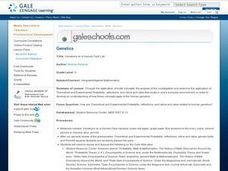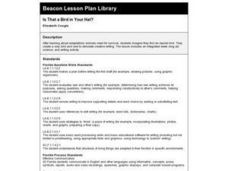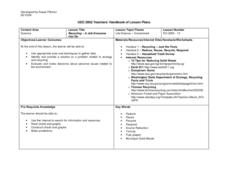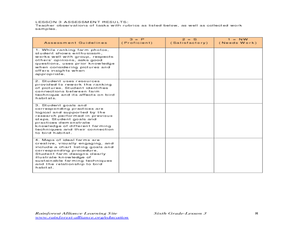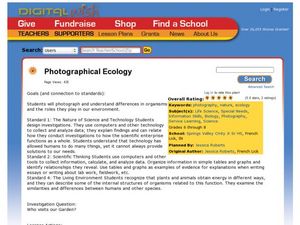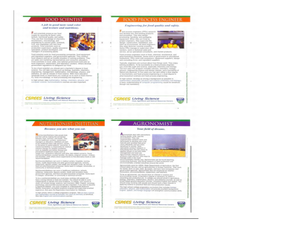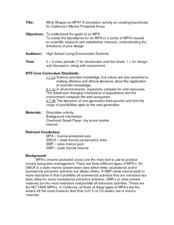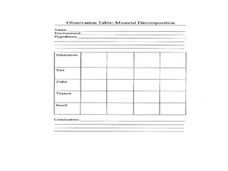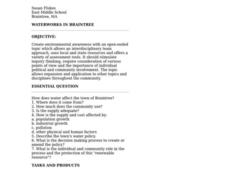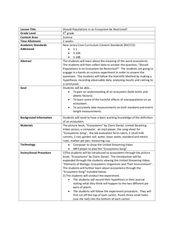Curated OER
Variations on a Human Face Lab
Ninth graders gain an application level understanding of probability, symmetry, and ratios and rates that exists in one's everyday environment relative to human genetics.
Curated OER
Growing bacteria
Students investigate the growth of bacteria under the right condition. In this biology lesson plan, students observe the growth of bacteria and fungi given the perfect condition to grow. They graph the result and investigate where else...
Curated OER
The Last Great Race
Third graders identify and discover why the Iditarod race is done each year. They explore the historical significance of the Iditarod. Students also use web sites to research related topics, i.e. diseases (diptheria), geography of...
Curated OER
Whale Watcher Game Lesson
Students participate in an online whale watching game. They identify the reasons for migration and describe the route. They make predictions on what would happen if the ways did not migrate.
Curated OER
Is That a Bird in Your Hat?
Second graders imagine they find an injured bird. They create a clay bird and nest to stimulate creative writing. The lesson includes an integrated week-long art, science, and writing activity.
Curated OER
Utah's Harvest
Fourth graders recognize the importance of the physical geography on a community. In this commodities lesson, 4th graders graph the five most important commodities of Utah. Students understand why these commodities are so...
Curated OER
Dirty Water
Students, through a case study of actual water sources in Washington State, identify major sources of aquatic pollution. They also categorize pollutants, make inferences about the effects of pollutants on the environment and construct...
Teach Engineering
Maximum Power Point
Investigate the maximum power output of a photovoltaic panel with a instructional activity that introduces the class to the maximum power point. Individuals learn how to determine the maximum power point of a solar panel by using Ohm's...
Curated OER
Recycling - A Job Everyone Can Do
Students research recycling effort that take place in the US. They play an online game and complete handouts using Internet research.
Curated OER
It's Not Easy Being Green
Students complete a unit that focuses on their school's waste production. They conduct a litter survey, collect the waste produced in their classroom for a week and generate a waste-audit, and identify how their school can minimize...
Curated OER
How can my breakfast help the birds?
Sixth graders design farms with a bird's habitat in mind. In this farm lesson plan, 6th graders research how sun grown coffee destroys a bird habitat, and then they make their own farm with a bird's habitat being preserved. They then...
Curated OER
The Pickle "Dill"emma
Students study a problem in their local farming community regarding a pickle factory, and the class is asked to help determine if the pickle factory is the source of a seed germination problem.
Curated OER
Photographical Ecology
Learners study organisms and the roles they play in nature. In this ecology lesson, students photograph several examples of organisms during a nature walk. Learners print out their photos and classify the organisms as plants or animals.
Curated OER
Michigan Food: From Farm to You
Young scholars recognize Michigan on a map and understand how its climate is affected by the Great Lakes. In this Michigan food lesson, students play a trivia game to identify the produce of Michigan. Young scholars relate the climate in...
Curated OER
What Shapes a MPA?
Learners identify the three types of MPA in California. For this marine science lesson, students analyze information provided to design a new MPA. They justify their reasoning in class.
Curated OER
Slow Rot or Not?
Fifth graders examine how environmental factors affect decomposition. In this decomposition activity, 5th graders experiment with the decomposition of grapes in five different environmental settings. They look at images of items that...
Curated OER
Microclimates of Our School
Students read the story "Weslandia" by Paul Fleischman, define the term microclimate, gather and record data in various places on school grounds to establish the presence of difference microclimates, analyze and compare microclimates,...
Curated OER
Water Cycle (Role of Water)
Second graders explore the role of water as a natural resource in order to conserve and protect its use for future generations.
Curated OER
Should Populations in an Ecosystem be Restricted?
Fourth graders experiment to determine how overpopulation effects ecosystems specifically plants. In this ecosystem instructional activity, 4th graders conduct an ecosystems experiment after listening to Claire Daniel's, Ecosystems. They...
Curated OER
The Lesson of the Kaibab
Learners plot the Kaibab deer population from 1905 to 1939 and analyze the changes over time. In this populations lesson plan, students investigate the causes of changing populations of the Kaibab deer and they find the carrying capacity...
Curated OER
Can Acid and Bases Remedy the Body?
Students experiment with acids and bases using technology-based "probe-ware", computers, and household products in this exciting biology/chemistry lesson. The lesson was written for an advanced 6th grade class.
Curated OER
Three R's to Environmental Stewardship: Earth Day
Students explore the ways to conserve our natural resources. In this recycling, reusing, and reducing lesson students read Dinosaurs to the Rescue and apply their findings to learning ways to conserve resources. Students complete a...
Curated OER
World Population
Young scholars examine the world population data using MyWorld GIS software and compare and contrast the population characteristics of countries around the world. Students summarize their findings in a report.
